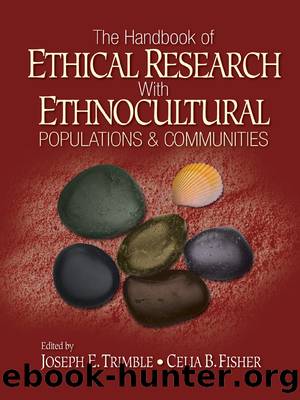The Handbook of Ethical Research with Ethnocultural Populations and Communities by Trimble Joseph E.;Fisher Celia B.; & Celia B.Fisher

Author:Trimble, Joseph E.;Fisher, Celia B.; & Celia B.Fisher
Language: eng
Format: epub
Publisher: SAGE Publications, Incorporated
Published: 2005-08-11T00:00:00+00:00
THE FUTURE OF RESEARCH ETHICS INVOLVING IMMIGRANTS AND REFUGEES
This chapter has outlined a large set of complexities in carrying out ethical research with immigrants and refugees. Reviewing the long list of issues and problems, one might conclude that it is much simpler not to do research with these groups! Yet as argued in this paper, this would not be an ethical stance. Rather, researchers must acknowledge and embrace the complexity of all groups in our society and include them in research projects.
A major theme of this chapter has been the notion that the level of complexity involved in doing research with diverse and vulnerable groups precludes the possibility that any code of ethics can fully anticipate and successfully resolve the multiple ethical dilemmas that arise in the course of doing this work. Researchers must be familiar with the ethical issues and concerns of the immigrant cultures. In addition, researchers must devote sufficient time and resources to engaging in a lengthy process of recruiting participants into the research project, obtaining truly informed consent, and assuring ethical treatment of participants.
We have learned to never underestimate possible differences in the ways that our perceptions of ethical issues differ from those of the community members. Only ongoing communication can unearth such differences and prevent potential ethical violations. Without such efforts, the researcher can remain naive about ongoing ethical issues; yet the fact that the researcher is unaware of an ethical violation does not mean that it isnât occurring.
Finally, such a process can only be successful if multiple cultural insiders are active and influential members of the research team. Further, it would be valuable for the field to learn more from the experiences of cultural insiders on the research teams, those persons whoâve been hired by researchers to help inform the research process. Perhaps insight into their experience can help us restructure the ways in which we organize the research process so as to ensure that they can help us, cultural outsiders, conduct ethical research in their communities.
Download
This site does not store any files on its server. We only index and link to content provided by other sites. Please contact the content providers to delete copyright contents if any and email us, we'll remove relevant links or contents immediately.
Rewire Your Anxious Brain by Catherine M. Pittman(18644)
Talking to Strangers by Malcolm Gladwell(13349)
The Art of Thinking Clearly by Rolf Dobelli(10455)
Mindhunter: Inside the FBI's Elite Serial Crime Unit by John E. Douglas & Mark Olshaker(9324)
Becoming Supernatural by Dr. Joe Dispenza(8201)
Change Your Questions, Change Your Life by Marilee Adams(7760)
Nudge - Improving Decisions about Health, Wealth, and Happiness by Thaler Sunstein(7693)
The Road Less Traveled by M. Scott Peck(7594)
The Lost Art of Listening by Michael P. Nichols(7494)
Mastermind: How to Think Like Sherlock Holmes by Maria Konnikova(7323)
Enlightenment Now: The Case for Reason, Science, Humanism, and Progress by Steven Pinker(7306)
Win Bigly by Scott Adams(7184)
The Way of Zen by Alan W. Watts(6601)
Daring Greatly by Brene Brown(6504)
Big Magic: Creative Living Beyond Fear by Elizabeth Gilbert(5756)
Grit by Angela Duckworth(5605)
Ego Is the Enemy by Ryan Holiday(5415)
Men In Love by Nancy Friday(5234)
The Laws of Human Nature by Robert Greene(5173)
